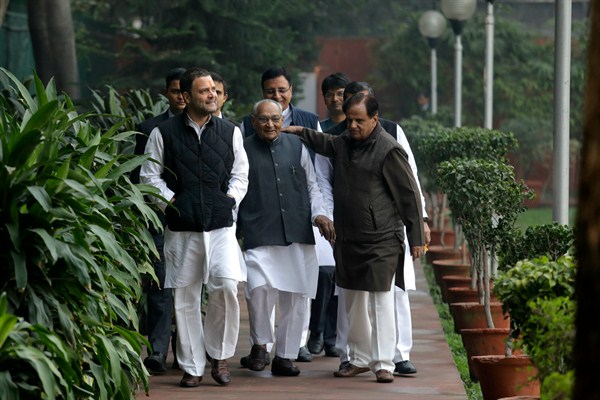On Dec. 4, Rahul Gandhi, the scion of India’s dynastic Gandhi-Nehru family, submitted forms to take over the leadership of the Indian National Congress party from his mother, Sonia Gandhi. Later this month, he is set to become the sixth member of his family to head the party. Since suffering a defeat in the 2014 elections to the Bharatiya Janata Party, or BJP, Congress’ popularity has fallen to the lowest point in its long and storied history. In an email interview, Sumit Ganguly, a professor of political science and Tagore Chair in Indian Cultures and Civilizations at Indiana University, Bloomington, describes what the young Gandhi’s stewardship means for Congress’ future, and why India’s broader political opposition looks ill-equipped to take on the powerful, Hindu nationalist BJP.
WPR: What did Rahul Gandhi’s elevation to head the Congress party signal about the state of the party and its prospects for the future?
Sumit Ganguly: It demonstrates the stranglehold of the Nehru-Gandhi dynasty. There seems to be a pervasive belief within the party that the Gandhi name is a sure-fire way to get votes, even though the available evidence points to the contrary. More to the point, it also suggests that the party stalwarts believe that there is no other individual who has a nationwide following. This, of course, veers on becoming a self-fulfilling prophecy: If you do not allow anyone other than a member of that family to seize the reins of the party at the national level, you will never have a leader of truly national stature with nationwide name recognition. It also highlights a profound propensity for sycophancy within the party. Apart from this family cult, the party for the most part is bereft of ideological coherence. Congress provides an anemic defense of secularism; it is loath to wholly embrace economic liberalization; it has supported a range of welfare-like policies of uneven efficacy; and was implicated in stratospheric corruption scandals during its last term in office as head of the governing United Progressive Alliance that ended in 2014. Given its abject lack of leadership combined with the hollowing out of its ideological core, it is hard to see how Congress can be a viable source of opposition to the BJP.

